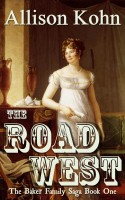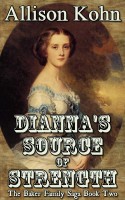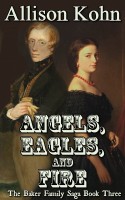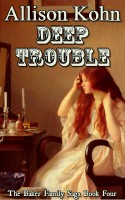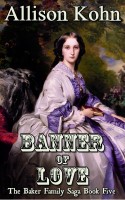I Read, I Write
Reading and writing books is what I do.
William Struse writes literary books that are easy to read and not put down until you finish. this one is a non-fiction look at the Savior through the numbers in the bible which, by the power and through the direction of the Holy Spirit, use certain numbers to point to Yeshua as Christ. It is a fascinating study for lovers of Math as well as those of us who are confused by numbers. Don't miss this delightful read.

I have only read a couple of the first pages and it occured to me that this is going to be one of my favorites and I would like to share that fact with my readers. It is not written by an amature writter ans the author knows what he is talking about. Pick up a copy and we will read it together.
The Baker Family Saga
Series: The Baker Family Saga, 1. Price: $2.99 USD. Words: 61,570. Language: English. Published: August 17, 2014. Category: Fiction » Christian » Historical
Series: The Baker Family Saga, Book 2. Price: $2.99 USD. Words: 41,890. Language: English. Published: August 20, 2014. Category: Fiction » Christian » Historical
Series: The Baker Family Saga, Book 3. Price: $2.99 USD. Words: 42,210. Language: English. Published: August 21, 2014. Category: Fiction » Christian » Historical
Series: The Baker Family Saga, Book 4. Price: $2.99 USD. Words: 82,480. Language: English. Published: August 25, 2014. Category: Fiction » Christian » Historical
Series: The Baker Family Saga, Book 5. Price: $2.99 USD. Words: 51,950. Language: English. Published: August 25, 2014. Category: Fiction » Christian » Historical
This is the second book in the Baker family Saga. Dianna is growing up and Richard is grown and ready for Princeton. Jonathan's not doing well and his doctor son, Miles, can't discover why. A death in the family effects everyone. Chester Thomas is as old as Richard physically, but he is worse with age, while Richard is more mature. Dianna looks good to him, but he scares and sickens Dianna. Then three other men move into Ferndale - a man and his two grown sons, Dianna looks good to both of them but only the younger one pays any attention to Dianna. Unfortunately he does not impress Dianna, but his brother is the answer to her dreams. In the midst of this unhappy love triangle Chester Thomas comes back to the west intent on evil.
Poor Joseph has been maligned as a spoiled brat by some. Sunday School teachers portray him as the boy whose brothers were mad because his daddy gave him a pretty coat. But Joseph was more than either of those portrayals. He was a human being, with human failings like you and me. The difference with Joseph was his God. God set him apart and molded him for a special job. He gave him a good reputation, a wife and sons - a new life in a foreign land when his position and natural rank were ripped away from him. I have tried to fill in the blanks in this book of fiction based on his life as recorded in the Bible.
Reading good books
I have been having a bit of trouble since I had to get my nose operated on and now I have a head cold that is keeping me from doing a good job – really, anything at all. But I have my ipad with the ability to make the words large enough to read without my glasses. (I can’t see with my glasses too well since the operation.)
All the above is to say that I have been reading some good books. I finished one by Lesiie Caine last night. I enjoyed it immensly in spite of the missplaced words, missing words, etc. that every book seems to be full of in this electronic age. I have learned to overlook a lot of mistakes while I’m reading. That’s probably why I overlook my own mistakes whien I proof read. I noticed in the last years that even the reprinted books from the days of the old printing press when there were no mistales have mistakes.
I hope you all can learn to enjoy a good book without being stumped by the electronis errors too. Read some of Leslie’s books. She is quite an entertaining writer.
Happay reading.
This is the second book in the Baker family Saga. Dianna is growing up and Richard is grown and ready for Princeton. Jonathan's not doing well and his doctor son, Miles, can't discover why. A death in the family effects everyone. Chester Thomas is as old as Richard physically, but he is worse with age, while Richard is more mature. Dianna looks good to him, but he scares and sickens Dianna. Then three other men move into Ferndale - a man and his two grown sons, Dianna looks good to both of them but only the younger one pays any attention to Dianna. Unfortunately he does not impress Dianna, but his brother is the answer to her dreams. In the midst of this unhappy love triangle Chester Thomas comes back to the west intent on evil.
This is the second book in the Baker family Saga. Dianna is growing up and Richard is grown and ready for Princeton. Jonathan's not doing well and his doctor son, Miles, can't discover why. A death in the family effects everyone. Chester Thomas is as old as Richard physically, but he is worse with age, while Richard is more mature. Dianna looks good to him, but he scares and sickens Dianna. Then three other men move into Ferndale - a man and his two grown sons, Dianna looks good to both of them but only the younger one pays any attention to Dianna. Unfortunately he does not impress Dianna, but his brother is the answer to her dreams. In the midst of this unhappy love triangle Chester Thomas comes back to the west intent on evil.
My Notes On Writing Fiction
The Machanics of the Story
Definitions
A run on sentence is a sentence with more than two “and”s.
Reins are what you control your horse with
Reigns are what kings do
Shutter window dressing
Shudder shaking badly
Wonder uncertain or amazed
Wander walk aimlessly
Lay The action is done for something
Lie What something does
Further is in your head
Farther is on a map
Complimentary To express approval
Parts of Speach
Noun:
Indentfies or names a person, place, thing, action,, or quality
Two types: 1. Proper 2. Common
!. A proper noun names a particular person, place, or thing and ALWAYS begins with a capital letter.
- A common noun names a type of person, place, or thing. There are three kinds of common noun. 1. Concrete, 2. Abstract, and 3. Collective
- Something you can feel or touch is a concreate noun.
- Something you cannot feel or touch is an abstract noun.
- A group pf people, places., or things is a collective noun.
The spelling of a singular noun almost always changes when it becomes plural by adding an “s” or “es”.
Appositives:
A noun or unit of words acting as a noun whose meaning is a direct copy or extension of the meaning of the preceeding noun in the sentence (explains or expands the noun.
Possessives:
A noun whose form has changed to show posession. With a singular noun add an apostrophe, and “s”, or when it ends in “s” omit the extra “s” after the apsotrophe. With a plural noun add an apostrophe if it ends in “s” – if not add an aprostophe and an “s”. With a compound noun only the last word takes the possessive form, as with two or more nouns that possess the same thing. When two or more bouns possess individula things each get the possessive form.
Pronoun
A word that represents a person, place, or thing is a pronoun. There are 5 classes. !. Personal, 2. Relative, 3. Demonstrative, 4. Indifinate, 5. Introgative.
- Personal first person is the person speaking, second person is the person spoken to, and third person is the person or thing spoken about.
- A reflective pronoun is formed from certain personal pronouns by adding the suffix “self” or “selves” Reflective pronouns reflect the action back to the subject so there must be a subject to which it reflects. An intensive reflective pronoun adds force or emphesis to the noun. Example: You yourself must go.
- A relative pronoun introduces a descriptive clause – which, that, who, whoever, whose, whom.
- A demonstrative pronoun is used to point out a particular person, place, or thing – this, that, these, or those.
- An introgative pronoun asks a question such as who?, what?, or which?
- Nominative, 2. Objective, and Possessive
- A nominative pronoun is a pronoun that is the subject or part of the subject of a sentence – or a pronoun that is a predicate ( the verb or verbal phrase that asserts something about the subject – example: the word “green” in “Grass is green.”).
- Objective pronouns are direct objects of the verb.
- Possessive pronouns show ownership; they never have an aprostophre.
Pronoun cases:
Me and I
One can say “John and I went to the show,” instead of “John and me went to the show,” because “Me” won’t stand alone. In other words one can’t say, “Me wemt to the show.” By the same token one can’t say , “He gave the tickets to John and I,” because “I” won’t stand alone. One must say, “He gave the tickets to John and me.”
Verb
A verb expresses an action or a state of being.
- Action: physical or mental
- State of being: condition or state of being
Transative verb
A transative verv is an action performed on someone or something (the direct object) and sometimes the indirect object.Example: “The captain handed us our orders.” “Handed is the verb, us is the direct object (what?), orders is the indirect object (whom? Or what? – for whom? Or for what?).
Intransative verb
An intransative verb has no object because no question can be answered.
Linking verbs
A linking verb joins a noun or nouns to another noun or unit of words that make up a noun to rename or describe the first noun. It is always intransative ane expresses a state of being – to be and all forms of to be such as am, are, is, was, and were. Other common linking verbs include act, appear, become, feel, grow look, remain, seem, smell, sound, taste, turn.
An adjetive that follows a linking verv is a Predicate adjetive.
A noun that follows a linking verb is a predicate nominativee.
Voice
The subject of a transative verb either performs or receives the action. A verb whose subject performs is said to be the active voice. A verb whos subject receives is said to be the passive voice. Example of active: Linda nursed the wounded soldiers. Example of passive: The soldiers were nursed by Linda.
Another of Samantha's book covers
One of Samantha's book covers
www.facebook.com/photo.php?fbid=10203317707522840&set=pcb.10203317714483014&type=1
Samantha Makes beautiful book covers
Previously published as Evelyn's anxious Bench,this is the first book in the Baker family saga. In 1842 the first wagon train left Independence, Mo. for the west coast. Jonathan Baker's family was grown and had families of their own, but Jonathan was the patriarch and when he decided he wanted his family to be among the first to settle the west coast and establish a town in the valley along the Willamette River he had his way. His oldest daughter, Evelyn didn't like it one bit. She had to leave her upper class society and home with all its amenities; but that was the least of it. She had to leave her servants behind because her father decided they wouldn't need them on the trail. Her thoughts were that he had no idea what servants were for and how much they were needed. She thought that was the worst thing that could happen to her, but soon found out it was the least of her problems. When tragedy struck, she had no one to turn to. She was determined to be a perfect woman and perfect women don's share their problems with their friends and family. This is what Gene Covington says about the story: As you travel the pages of the story you can literally feel the transformation of the folks as they go from a life of dependent luxury and of little self worth to people with strength, personal pride and integrity. It is of people who knew and cared little about God. As they journey from comfort in the east to build a new town in the west in the 1800's you experience their hardships, lost loved ones, pain and suffering. You will also become a member of the family and wagon train and share in their family love and happy and exciting experiences. Their discovery of God and the records his prophets left to help them live by is an exciting part of the book.
As they travel Bear River I could smell the air, hear the roar of rapids and I longed to be there for I have traveled, fished and hunted that land. Thanks for taking me there once again.
This first book by Susan won won the Agatha Award for First Novel, The Daphine du Maurier award for exellence in Mystery/Suspense, and RWA Golden Heart finalist. I would love to give it an award myself for exellence in using the goast of a chikdhood friend to move the story along at a good pace. She says she's not a goast, she is a spirit, but they are the same thing so I call her a goast. I loved this book and know anyone who likes a good mystery will too.
Genesis, chapter two
Chapter 2
We must remind ourselves again that this book was written for the ancient decendents of Israel and go back and see how the people of that time and space would think. John Walton is a student of ancient cosmology and a profesor of Old Testament at Wheaton College. He says 23 the people whom Moses was writing to would have understood the account of the seventh day of rest to be a temple text and consider it to be the most important of the seven days. To the ancients rest resulted when a crisis was resolved. Rest would be a matter of engagement without obstacles as opposed to our defination of disengagement without responsabilities.
Yahwea disingaged from the set-up tasks and began regular operations. The cosmos is the temple he rules from.
Now we have the story of how it all started with the understanding of the people it was first written to. Here Yahweh, through Moses, tells his people that before any vegitation had sprouted from the earth or rain had fallen from the sky the earth was watered from underground springs.
Again, this is not a scientific explaination; this is a story to explain to the people of the Near East, through whom Yahweh choose to spread his love to the rest of the world, what a wonderful world mankind lost.
Yahweh formed man out of the dust of the ground, planted a garden for him to live and work in and put those two trees in the middle surrounded by other trees that were beautiful to look at and good to eat from. Yahweh had given mankind his image – his moral fiber. He was able to choose right and hang on to his righteous character.
The description of the garden of Eden as a place where all the senses are continuelly pleased demonstrates how much mankind had to loose.
The creation of woman would indicate that we need community and the best companion for a man is a woman. Man had already maned all the other animals and didn’t find any with his brain power or any other atribute to match his abilities and stimulate his growth. The picture of Yahweh taking a rib from Adam and forming it into a mate for him suggests more to us now than it would have to us back in the time and space of the ancient Near East.
My own emotions and brain cells tell me that asexual life misses more than sexual and intelectual intercourse. Two people working side by side, even without speach, enriches the sensual appreciation of the work. The same goes for play.
Hey guys, do you know what kind of reader are you?

Book lovers have different personalities just like ordinary people. We find it hard to choose only one as it also depends on the book(s) we're reading. For the most of the time we'll go for a mix of Polygamist+Extrovert+Altruist. Some books, however, make us monogamist introverts. And a very very tiny percentage of titles change us into neurotic readers.
How about you? Share your personalities in the comment section below.





